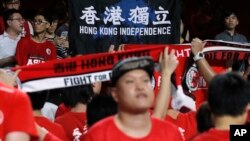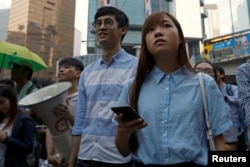The music thrums in 2/4 meter and a lively midpoint bounce. The lyrics of China’s national anthem, “March of the Volunteers,” exhorts citizens to fight the foreign invader.
Arise, ye who refuse to be slaves!
With our flesh and blood let us build a new Great Wall!
The Chinese nation faces its greatest peril,
The thundering roar of our peoples will be heard!
In Hong Kong, the roar these days rises from a different quarter — city residents alert to orders from Beijing.
China’s congress outlawed disrespect of the national anthem in November, and included Hong Kong in its reach. Last month, an office of the local government drafted language for the legislature that seeks to punish those who disrespect or misuse the anthem with a fines as high as $6,370 US ($50,000 HKD) and up to three years in prison.
Hong Kong’s legislature would have to pass it's own law and a formal bill is due to be introduced in July. The directive was unwelcome by activists in a city with its own constitution, free speech rights, and democratic aspirations. Any order that residents be patriotic struck many people as impossible to expect or enforce.
“There are a number of ingredients that would get you into trouble,” said pro-democracy lawmaker Alvin Yeung. “But how on earth can you predict when the [draft] law is so uncertain?”
Many of the city’s young have fought injunctions that they be more patriotic toward the People’s Republic. The insults to the anthem are most noticeable in Hong Kong’s soccer stadium, where fans have booed and turned their backs when the national anthem sounds before matches.
Hong Kong’s Chief Executive Carrie Lam has shrugged off critics. She said the judiciary won’t prosecute people who accidentally insult the anthem. Worries may be overblown she said in remarks released by the government.
That’s not comforting in a city where people who blocked streets during the 2014 democracy protests are being jailed for months, and some more than a year.
Since the British turned the territory over to China in 1997, Beijing has tried repeatedly to impose civic standards and exhort city residents to be more patriotic. But since 1998, most residents have told the University of Hong Kong Public Opinion Programme that they are Hong Kongers, while a minority identifies as Chinese.
The PRC anthem is a routine, if ignored, feature of life in Hong Kong. The song was played during the ceremony in 1997 when China assumed oversight. . (That night, Hong Kongers also heard “God Save the Queen” before the Union Jack was lowered.) China’s national song plays at government events and every evening on local TV as part of a government effort to instill civic spirit.
The draft language strikes many residents as unclear or downright impossible to craft into a local ordinance. It requires that a Hong Kong law preserve the anthem’s dignity, require people to “deport themselves respectfully” during the performance, as the city enhances the “sense of nation” among citizens. It requires that primary and secondary schools teach students to sing the anthem, and bars performance that would be “harmful to the dignity of the national anthem.” Anyone who deliberately alters the lyrics or score, or sings “in a distorted or derogatory manner” or insults shall be liable for a fine or imprisonment.
Critics add the draft does not direct how a government would preserve and monitor such behavior, nor how it would, as the national law proscribes, “cultivate and practice the core values of socialism.” Hong Kong is an executive-led system (albeit one that caters to Beijing’s wishes) with independent courts, although China’s legislature has intervened and steered rulings.
The anthem draft language deviates from Common Law, which is based on defined customs and judicial precedent, not subjective ideals.
“It is very common in the Chinese law system to include ideological provisions in legislation,” said Eric Cheung, a pro-democracy activist and a lecturer at the University of Hong Kong Law School. “It’s also common to include provisions for guidance and direction rather than enforceable provisions. In our legislation, we don’t include ideological provisions.” It would be hard, for instance, to define “patriotic” in Common Law.
It’s always possible that an anthem bill could be vetoed in the legislature, but not likely. After six recent disqualifications of pro-Democracy members, election losses, and altered rules that bar filibusters, the pro-Beijing bloc prevails.
Lam told reporters that there would not be a public consultation, or formal process for expressing opinion. “There appears to be almost no controversy in society on this,” she told the media.










